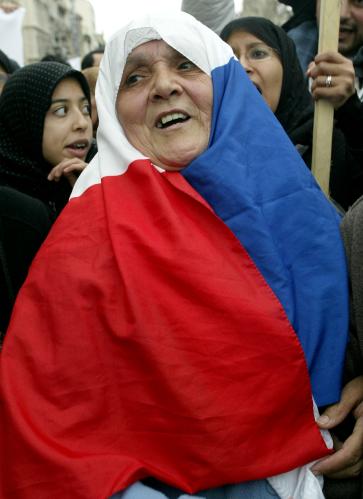Editor’s Note: In an interview on the Diane Rehm Show, Jonathan Laurence and Akbar Ahmed discuss the July 13 vote in France’s lower house of Parliament to ban face-covering veils.
Diane Rehm: You said that the proposed ban attracts lots of attention but that in some ways it obscures more important issues in France. Talk about what you mean.
Jonathan Laurence: Well I think that just reading the headlines in France, or perhaps even from Switzerland last fall, regarding the ban of the minaret or the prohibitions from wearing the head scarves in French schools from several years ago, one could get the impression that across western Europe there’s a growing restriction of them, with regard to Islamic religious practices. But I think that would be a myth. Another trend that is also taking place that has to do with growing religious freedom for Muslims in western Europe, and I know that sounds paradoxical but if you look at the French religious landscape, you’ll see that there are more than 2,000 Islamic prayer spaces, which is the fastest growing number in all of Europe, there are thousands of Imams practicing freely and even programs run here in the ministry of France to help train them. There is a great concern for religious equality that is obscured by the more marginal phenomenon of Burkhas in particular, which many, which very few women actually wear.
Rehm: So are you saying you believe that the French are creating problems for themselves?
Laurence: Well it’s an attractive issue, as a kind of electoral ploy, if you like. The target audience is extremely small. There are about 2,000 women in all of France, including the overseas territories, who wear the Burkha and as the embassy spokesman mentioned, very few French Muslims and French Muslim leaders are willing to defend the Burkha as a requirement of Islamic religious practice. In fact no one was willing to say it was a religious prescription, which is very different obviously than the wearing of the headscarf, and so I think its an attractive issue because it actually affects very, very few people.
Rehm: Akbar [Ahmed] would like to pose his thoughts.
Akbar Ahmed: My thought is this, you know this excellent debate between two very impressive Muslim women, is illustrating exactly my concern, which is the debate about covering or not covering becomes a diversion, a red tangent when the issue facing both women and men in Muslim societies and there is a great deal of crisis in Muslim society, there’s a crisis of leadership, women aren’t given their inheritance in many Muslim societies, the laws of inheritance allowed by Islam are not allowed to women, the role of women as political leaders, as social leaders, you what’s happening in parts of Pakistan, Afghanistan, those are the real issues and I’m very confidant that the women, they are fighting for their rights, within Islam itself. You had the example of women like Benazir Bhutto, she didn’t get caught up in wearing the Burkha, she covered herself with the veil as most women do in that part of the world, but didn’t make a big issue out of it and succeeded in becoming a role model of millions and millions of Muslim women and becoming the first female prime minister of a Muslim nation.


Commentary
Banning the Veil in France
July 13, 2010